Energy and ecosystems -> kingdom
Kingdoms in Science
In science, a kingdom is a high-level taxonomic rank, which is used to categorize organisms. Organisms are grouped into different kingdoms based on their characteristics and evolutionary relationships. The classification system starts with the broadest category, which is the kingdom. There are currently five recognized kingdoms in the classification system: Animalia, Plantae, Fungi, Protista, and Monera.
Five Kingdoms
- Animalia: This kingdom consists of multicellular, eukaryotic organisms that are heterotrophic, meaning they obtain their energy by consuming other organisms. Examples include mammals, birds, insects, and fish.
- Plantae: Organisms in this kingdom are multicellular, eukaryotic, and autotrophic, meaning they produce their own food through photosynthesis. Examples include trees, flowers, grasses, and shrubs.
- Fungi: This kingdom contains eukaryotic organisms, including mushrooms, molds, and yeasts. Fungi are heterotrophic and obtain nutrients through absorption.
- Protista: The protists are a diverse group of eukaryotic organisms that do not fit into the other kingdoms. They can be unicellular or multicellular and may be autotrophic or heterotrophic. Examples include algae and protozoans.
- Monera: This kingdom includes single-celled organisms that lack a nucleus and other membrane-bound organelles. Bacteria and archaea are the primary members of this kingdom.
Study Guide
To better understand the concept of kingdoms in science, consider the following study guide questions:
- What is a kingdom in the classification system?
- What are the five recognized kingdoms and what are the primary characteristics of organisms in each kingdom?
- Provide examples of organisms belonging to each kingdom.
- How are organisms classified into different kingdoms?
- Why is the concept of kingdoms important in the study of biology and ecology?
Additionally, you can explore the evolutionary relationships between organisms in different kingdoms and how advancements in technology have influenced our understanding of kingdom classification.
[Kingdom] Related Worksheets and Study Guides:
.◂Science Worksheets and Study Guides Fifth Grade. Energy and ecosystems
Study Guide Energy and ecosystems
Energy and ecosystems  Worksheet/Answer key
Worksheet/Answer key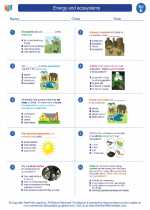 Energy and ecosystems
Energy and ecosystems  Worksheet/Answer key
Worksheet/Answer key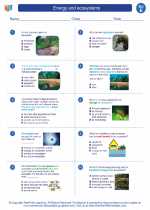 Energy and ecosystems
Energy and ecosystems  Worksheet/Answer key
Worksheet/Answer key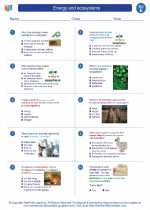 Energy and ecosystems
Energy and ecosystems  Vocabulary/Answer key
Vocabulary/Answer key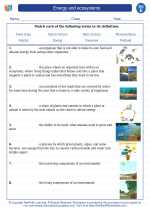 Energy and ecosystems
Energy and ecosystems  Vocabulary/Answer key
Vocabulary/Answer key Energy and ecosystems
Energy and ecosystems  Vocabulary/Answer key
Vocabulary/Answer key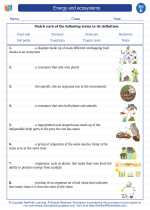 Energy and ecosystems
Energy and ecosystems 

 Worksheet/Answer key
Worksheet/Answer key
 Worksheet/Answer key
Worksheet/Answer key
 Worksheet/Answer key
Worksheet/Answer key
 Vocabulary/Answer key
Vocabulary/Answer key
 Vocabulary/Answer key
Vocabulary/Answer key
 Vocabulary/Answer key
Vocabulary/Answer key

The resources above cover the following skills:
PHYSICAL SCIENCE (NGSS)
Energy
Students who demonstrate understanding can:
Use models to describe that energy in animals’ food (used for body repair, growth, motion, and to maintain body warmth) was once energy from the sun.